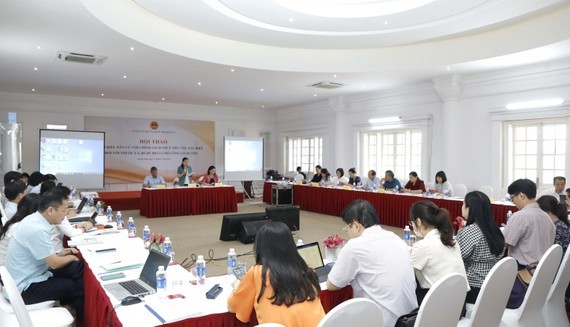 The scene of the seminar. (Photo: SGGP)
The scene of the seminar. (Photo: SGGP)
Ms. Do Thi Lan, Vice Chairwoman of the Social Committee, said that the Law on Special Consumption Tax had been applied to tobacco, alcohol, and beer products. However, the scope of drinks subjected to a special consumption tax is still narrow. Besides alcohol drinks and beer, low-alcohol beverages on the market, such as fermented fruit juices, and many other beverages containing unhealthy ingredients, namely sugar and stimulants, including soft drinks, carbonated drinks, and energy drinks, have not been yet regulated by this Law.
The excise tax rate for tobacco products is still low. The current excise tax rate is 75 percent on the selling price, not including value-added and excise taxes. With the application of this tax rate, the tax proportion in the retail price only accounts for about 36 percent of the retail price of cigarettes, lower than many countries in the ASEAN region and the world, whose tax proportion in retail price is about 56 percent on average.
Meanwhile, the World Health Organization (WHO) has pointed out that tobacco is one of the leading causes of morbidity and mortality. The proportion of smokers in the total population remains high, and smokers are distributed among all age groups.
“Resolution No.20-NQ/TW dated October 2, 2017, of the Party Central Committee on caring and improving people's health, has set out the policy of increasing special consumption tax on harmful goods, such as alcoholic beverages, carbonated drinks, and tobacco, to limit consumption. To institutionalize the above policy, it is necessary to study options to adjust the excise tax policy for some alcohol, beer, and tobacco products," Ms. Do Thi Lan emphasized.
At the workshop, a representative of the National Institute of Nutrition under the Ministry of Health said that sugary drink consumption in Vietnam had increased ten times in the 2002 – 2022 period. However, the excessive consumption of sugary drinks causes many health consequences, such as overweight, obesity, diabetes, metabolic disorders, effects on bones and teeth, cardiovascular disease, dementia, and cancer. Some countries have imposed excise taxes to limit the use of sugary drinks and have seen significant results.
In addition, seminar participants also proposed promulgating regulations on mandatory nutrition labels for products, including the declaration of sugar content; regulations on nutrition warning labels on the front of high-sugar and high-energy products; soon issuing policies to limit advertising, sponsorship, and promotion of sugary beverage products - especially for children; creating a favorable environment to reduce the consumption of sugary beverages; increasing the supply of healthy drinks; raising awareness about healthy beverage options; reducing the availability of sugary drinks.
The excise tax rate for tobacco products is still low. The current excise tax rate is 75 percent on the selling price, not including value-added and excise taxes. With the application of this tax rate, the tax proportion in the retail price only accounts for about 36 percent of the retail price of cigarettes, lower than many countries in the ASEAN region and the world, whose tax proportion in retail price is about 56 percent on average.
Meanwhile, the World Health Organization (WHO) has pointed out that tobacco is one of the leading causes of morbidity and mortality. The proportion of smokers in the total population remains high, and smokers are distributed among all age groups.
“Resolution No.20-NQ/TW dated October 2, 2017, of the Party Central Committee on caring and improving people's health, has set out the policy of increasing special consumption tax on harmful goods, such as alcoholic beverages, carbonated drinks, and tobacco, to limit consumption. To institutionalize the above policy, it is necessary to study options to adjust the excise tax policy for some alcohol, beer, and tobacco products," Ms. Do Thi Lan emphasized.
At the workshop, a representative of the National Institute of Nutrition under the Ministry of Health said that sugary drink consumption in Vietnam had increased ten times in the 2002 – 2022 period. However, the excessive consumption of sugary drinks causes many health consequences, such as overweight, obesity, diabetes, metabolic disorders, effects on bones and teeth, cardiovascular disease, dementia, and cancer. Some countries have imposed excise taxes to limit the use of sugary drinks and have seen significant results.
In addition, seminar participants also proposed promulgating regulations on mandatory nutrition labels for products, including the declaration of sugar content; regulations on nutrition warning labels on the front of high-sugar and high-energy products; soon issuing policies to limit advertising, sponsorship, and promotion of sugary beverage products - especially for children; creating a favorable environment to reduce the consumption of sugary beverages; increasing the supply of healthy drinks; raising awareness about healthy beverage options; reducing the availability of sugary drinks.
























